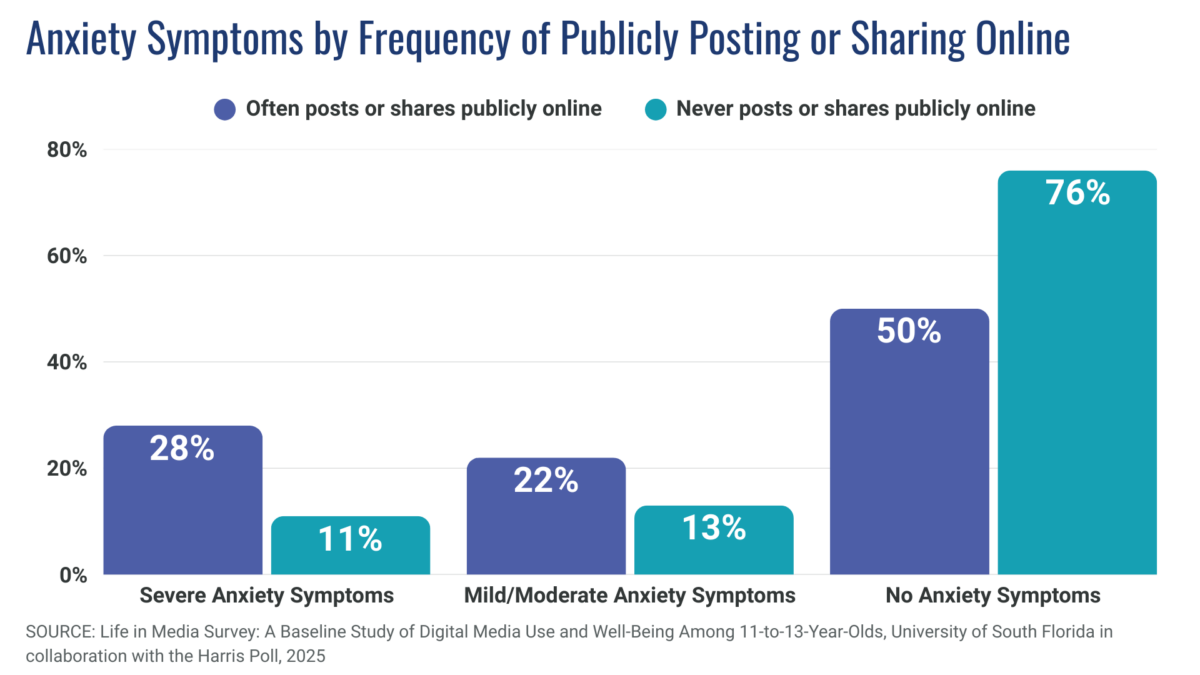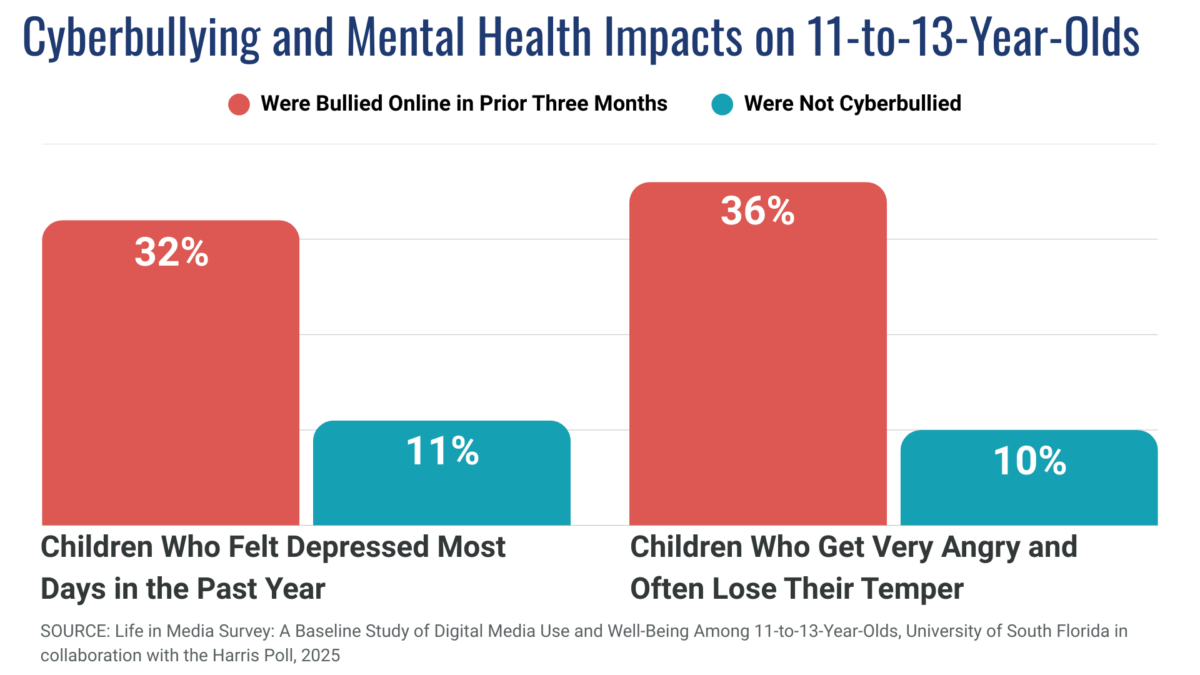
Survey: Online Experiences — Not Smartphone Ownership Alone — Tied to Youth Mental Health
As the country grapples with what former U.S. Surgeon General Dr. Vivek H. Murthy described as a youth mental health crisis, researchers have increasingly focused on the impacts of screentime, digital technologies, and related online behaviors on young people. The 2025 Life in Media Survey: A Baseline Study of Digital Media Use and Well-Being Among 11-to-13 Year-Olds is a collaboration between the University of South Florida and The Harris Poll. It builds upon previous research with new insight into smartphone ownership and online experiences among 11-to-13-year-olds. The researchers’ findings suggest, among other things, that smartphone ownership may have less impact on youth mental health than what young people do with their phones.
Researchers surveyed 1,510 young people in Florida on a wide range of topics including smartphone ownership and use, social media use, cyberbullying, depression, sleep deprivation, and anxiety. Florida, like Arkansas, has recently enacted several laws related to cell phones in schools and young people’s access to social media platforms.
One notable finding from the survey is that most children have access to smartphones and other digital devices. Of the children surveyed, 78% said they had their own smartphone, with the majority also having an associated data plan. Another 13% said they shared, sometimes used, or frequently used someone else’s smartphone. Fifty-six percent reported having their own tablet. Most of the 11-to-13-year-olds surveyed said they received their first tablet in the spring of 2020, near the onset of the COVID-19 pandemic. Most reported getting their own smartphone the following year.
Youth Mental Health, Smartphones, and Digital Behaviors
The researchers found no correlation between smartphone ownership alone and adverse mental health outcomes such as depression and anxiety among 11-to-13-year-olds. Regardless of whether the children had their own smartphones, though, researchers did find several consistencies across those surveyed, including:
- 51% said they would rather spend more time online than hang out with other people.
- 49% said they used technology to avoid feeling sad or to get relief from negative feelings.
- Nearly half of children agreed that “I don’t do things I’m supposed to do because I’m using technology.”
- 20% of children agreed with the statement, “Life often feels meaningless.”
- Current age requirements to open social media accounts had little to no effect on curbing access to those platforms.
Although the survey does not link screentime to poor mental health outcomes, it does note that the 11-to-13-year-olds surveyed reported spending 4.4 hours on their smartphones or tablets on an average school day. On non-school days, that increased to 6.3 hours. A 2024 report from the U.S Centers for Disease Control and Prevention’s National Center for Health Statistics did link four or more hours of screentime a day to increased anxiety and depression among 12-to-17-year-olds.
Benefits of Smartphone Ownership Among Young People
The researchers identified several areas where 11-to-13-year-olds appeared to benefit from having their own smartphone. For instance, children who had their own smartphone were slightly less likely to report feeling depressed, with 21% of smartphone owners saying they felt depressed most days in the prior year, compared to 26% of children who did not have their own smartphone. Children with their own smartphone also spent more days each week hanging out with friends in person and were more likely to say they felt good about themselves.
Negative Effects of Social Media on Youth Mental Health
One area where researchers identified a strong correlation between online behaviors and negative effects on youth mental health was social media use. Forty-four percent of 11-to-13-year-olds who said they often posted publicly online reported depressive symptoms, compared to 36% of those who said they never posted publicly.
Nineteen percent of all children surveyed had symptoms of severe anxiety, and another 18% reported mild or moderate symptoms of anxiety, but those symptoms were much more prevalent among children who posted online often. Of those who posted to social media often, 28% had symptoms of severe anxiety, compared to 11% of those who never posted or shared online.

Sleep was another area where social media use denoted a clear difference, with those who posted to social media often reporting greater sleep problems. One in four of those surveyed reported sleeping with their smartphone in their hand or in bed with them.
How Does Cyberbullying Affect Mental Health?
Researchers also asked students about their experiences with cyberbullying. Five forms of cyberbullying were identified for the survey:
- Having hurtful photos or videos posted about them online.
- Being called mean or hurtful names.
- Having rumors or lies spread about them.
- Were left out of a group or an activity, or were not allowed to join, on purpose.
- Were told others would not like them if they did not do what they were told to do.
Fifty-seven percent of those surveyed said they experienced at least one of these forms of cyberbullying over the previous three months. One in five reported experiencing one or more cyberbullying incidents one or more times a week.

The researchers noted that they used a low threshold for identifying cyberbullying, but the survey results suggest that even minimal degrees of cyberbullying can have a negative impact on young people:
- 32% of cyberbullied children said they felt depressed most days in the prior year, compared to 11% of un-bullied children.
- 36% of cyberbullied children said they often became angry and lost their temper, compared to 10% of un-bullied children.
The survey also suggests that attempts to protect children from cyberbullying by limiting access to smartphones or tablets may not be successful. Researchers found that for some types of cyberbullying, 11-to-13-year-olds without smartphones were as much as 50% more likely to be cyberbullied than children who have their own phones.
Social Media Age Restrictions
A Florida law that went into effect January 1 makes it illegal for children under 14 to open social media accounts and allows 14- and 15-year-olds to open accounts only with parental consent. However, the Life in Media Survey, conducted in November and December of 2024, found that many 11-to-13-year-olds in Florida already had social media accounts. Sixty percent reported having YouTube accounts, 55% had TikTok accounts, and 41% were already on Facebook. One in five children said they had multiple accounts on at least one platform for privacy reasons.
In Arkansas, Act 689 of 2023 required children under 18 to have parental permission to access social media accounts and placed the onus on social media platforms to verify user age, but a federal judge blocked the law earlier this year, ruling that it violated the First Amendment rights of Arkansans.
Florida’s law also faces legal challenges. Two technology trade groups, representing companies including Meta and Google, filed a lawsuit arguing that the law violates First Amendment rights. In March, a federal judge dismissed that case, saying the groups hadn’t shown that any of their member companies were directly affected by the law. The groups have since revised their complaint and continue to seek a court order to block its enforcement.
Legislation on Cell Phones in Schools
More than a dozen states have passed legislation to limit access to cell phones in schools. A 2023 Florida law bans cell phones during class for K-12 public schools. According to the students surveyed, however, results and enforcement of that legislation vary:
- 45% were not allowed to access phones during school.
- 22% had access to phones always or at certain times of the day.
- 29% were subject to teacher-specific policies.
Arkansas’s Bell to Bell, No Cell Act, which goes into effect in the 2025-26 school year, bans public school students from having smartphones and other personal electronic devices at school.
The University of South Florida researchers plan to expand the survey to more than 8,000 students nationwide and track their well-being for at least the next 25 years into middle adulthood.
For more insight into social media and youth mental health, see our topic page.
Distribution channels: Healthcare & Pharmaceuticals Industry
Legal Disclaimer:
EIN Presswire provides this news content "as is" without warranty of any kind. We do not accept any responsibility or liability for the accuracy, content, images, videos, licenses, completeness, legality, or reliability of the information contained in this article. If you have any complaints or copyright issues related to this article, kindly contact the author above.
Submit your press release